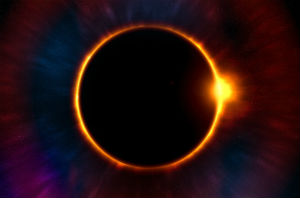How the solar eclipse will affect weather on Earth
21 August 2017

Wind-driven generation of electricity, as well as solar power, will be reduced during Monday’s solar eclipse in the US, scientists have predicted after analysing data from previous eclipse events.
Meteorologists from the University of Reading studied weather data obtained during the 1999 and 2015 total eclipses witnessed by millions in the UK. They found that, as well as the obvious reduction of the incoming solar energy, surface winds dropped dramatically and changed direction.
Professor Giles Harrison, Professor of Atmospheric Physics at the University of Reading, said: “As well as solar energy being eliminated during total solar eclipses, we found an associated reduction of wind speed, which is not always appreciated. This results from a reduction in atmospheric turbulence and mixing when the solar heating is removed.”
“Wind power generation is therefore not a good choice for mitigating the associated loss in photovoltaic power generation during eclipses.”
Total solar eclipses offer a rare opportunity to monitor weather conditions, in order for scientists to increase their understanding of how the atmosphere, and our weather, works.
In the newly-published study by Professor Harrison and Professor Suzanne Gray, ‘The weather’s response to a solar eclipse’, the Reading scientists explained ideas originating from studies of another great US eclipse on May 28th 1900, by American meteorologist H. Helm Clayton. It also built upon their National Eclipse Weather Experiment citizen science project in 2015 – the largest UK eclipse weather experiment ever carried out.
Both studies showed significant weather changes associated with a total eclipse. UK data from March 2015 also revealed that less electricity was generated by wind power during the eclipse.
In the UK, only 4% of the sun will be blocked by the moon at the peak of the eclipse at around 8pm BST. There will not be another partial solar eclipse in the UK until 2026.
Those watching Monday’s eclipse are reminded never to stare directly at the sun because of the severe risk of eye damage.
Full paper reference:
G. Harrison, S. Gray (2017). ‘The weather’s response to a solar eclipse’. Astronomy & Geophysics. doi: 10.1093/astrogeo/atx135
